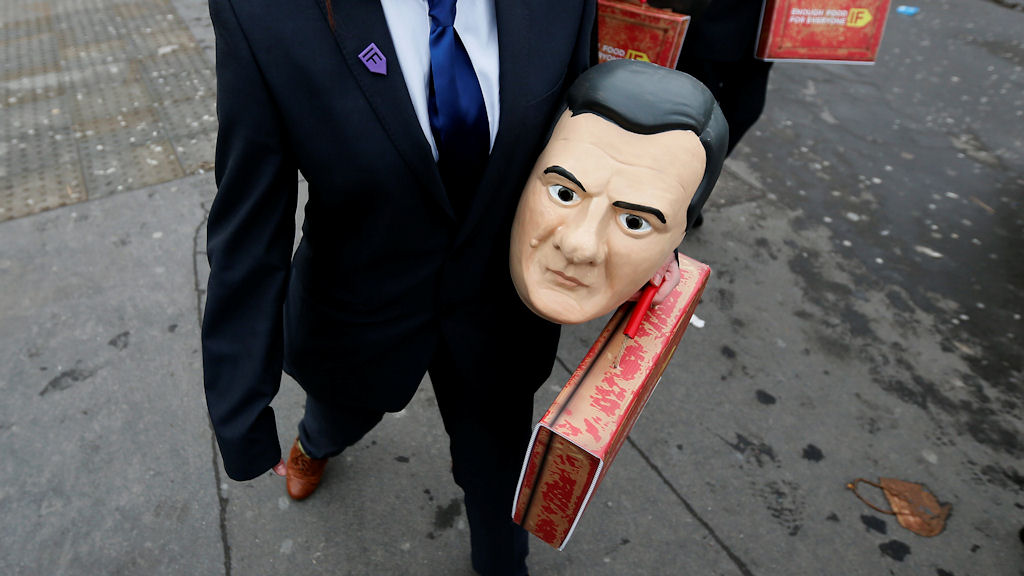Budget 2013: what to watch out for
Ahead of Chancellor George Osborne’s 2013 budget, here are five key things to look out for – from the changes which could hit your pocket to the numbers behind Britain’s zombie economy.

Cash is tight, memories of last year’s “omnishambles” budget are fresh, and the government is only two years away from an election. So George Osborne‘s 2013 budget is unlikely to be packed full of headline-grabbing surprises.
At the same time, the chancellor is well aware of the need to appeal to voters despite an ongoing tidal wave of worrying economic news – from the crisis in Cyprus to poor economic numbers closer to home, such as Tuesday’s inflation figures which showed that the cost of living was at a nine-month high.
Alex Henderson, senior tax partner at PricewaterhouseCoopers, told Channel 4 News he expected to see a balanced budget with “limited room for manoeuvre”.
He said: “I think there will be a few highlights in the budget. It would be surprising if the chancellor didn’t make use of the limited firepower he has around the narrative of trying to get the economy moving again.”
So what can we expect to emerge from the chancellor’s red box? Here are the five key themes to watch out for.
Economic gloom
Forecasters have predicted a “double whammy” of bad news for the chancellor from the Office for Budgetary Responsibility (OBR) on Wednesday, which gives its economic forecast to tie in with the budget.
The Ernst & Young ITEM Club said on Monday that it expected the government will have to reveal that it has borrowed £8bn more than previously forecast in the autumn statement, bringing public sector net borrowing up to £88bn. This matters because the government originally pledged to bring down borrowing over this period.
While this is a political embarrassment, more important economically is the OBR’s other blow for the chancellor. It is expected to revise its growth predictions for 2013 from 1.2 per cent to just under 1 per cent – painting a bleak picture for the UK’s debt-laden, slow-growing “zombie” economy for the rest of the year at least.
For your pocket
One of the most widely trailed expected changes is a move to accelerate the planned increase in the personal allowance tax threshold – the amount you can earn before you are taxed – to £10,000.
The government hopes the move, which will be supported across the coalition, will boost the economy and even encourage people into the workforce. But moves like this are expensive. PricewaterhouseCoopers predicts that each extra £100 increase costs the economy around £0.5bn. So what will be done to pay for it?
“It’s a broad measure affecting millions so he will have to pay for it somewhere… He will need to look for a similarly broad measure to pay for it, and areas where he could look are around national insurance,” said Mr Henderson.
For business
One of Mr Osborne’s key aims is to ensure that the UK looks open for business – despite the damaging loss of the AAA rating last month.
There are a number of measures he could take to do this, including reducing the rate of corporation tax by 1 per cent to 20 per cent. He could also look at the “patent box” – reducing the rates of tax for profits related to patents.
“The attraction of that is it makes the UK stand out internationally for high value-added, knowledge-type activities, to try and attract business to the UK,” said Mr Henderson.
The pasty tax?
After the humiliating “pasty tax” U-turn last year, Mr Osborne is expected to leave VAT well alone.
However, accountants pointed out (perhaps with their tongues in their cheeks) that if he wanted to fiddle at the edges in this way, there are some anomalies – for example, caviar is zero rated.
Other consumer levies that many expect to be thrown into the mix include an increase in taxes on cigarettes and alcohol – but fuel duty could see more wallet-friendly changes.
What we already know
The budget leaks this year have not been as bad as in some years – but some key measures have already emerged, perhaps in a bid to test the waters and avoid another omnishambles.
As such, we are all well prepared for more detail on the government’s plans to give working parents up to £1,200 of their annual childcare costs, as well as a £2.5bn switch from departmental running costs into capital projects.
Channel 4 News Political Editor Gary Gibbon described the measures thus: “The former (not coming in until October 2015) shows a government trying to connect with voters when money’s tight. The latter shows a government trying to get growth with little money in the kitty.”
What else will the budget hold – and will it revive zombie Britain? You can follow all of our Budget 2013 coverage here.
-
Latest news
-
Tim Booth of the band James’ on agism in music, topping the charts and AI6m

-
As India goes to the polls in the world’s largest election – what do British-Indians think?6m

-
Tees Valley: Meet the candidates in one of the biggest contests coming up in May’s local elections4m

-
Keir Starmer says public sector reform will be a struggle7m

-
Nicola Sturgeon’s husband Peter Murrell charged with embezzlement of funds from SNP1m

-





